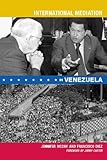International mediation in Venezuela / Jennifer McCoy and Francisco Diez ; [Foreword by Jimmy Carter]
Material type: TextLanguage: eng Publication details: Washington, D.C. : United States Institute of Peace, 2011.Description: xxii, 291 pages ; 23 cmISBN:
TextLanguage: eng Publication details: Washington, D.C. : United States Institute of Peace, 2011.Description: xxii, 291 pages ; 23 cmISBN: - 9781601270689 (alk. paper)
- 1601270682 (alk. paper)
- Mediación internacional
- Solución de conflictos -- Venezuela -- Cooperación internacional
- Democracia -- Venezuela
- Venezuela -- Politics and government -- 1999-
- Venezuela -- Política y gobierno -- 1999-
- Venezuela -- History -- Attempted coup, 2002
- Venezuela -- Historia -- Intento de Golpe de Estado, 2002
- 303.6/9
- JZ 5584 M478i 2011
| Item type | Current library | Home library | Collection | Shelving location | Call number | Copy number | Status | Date due | Barcode |
|---|---|---|---|---|---|---|---|---|---|
 Libro
Libro
|
Biblioteca Juan Bosch | Biblioteca Juan Bosch | Ciencias Sociales | Ciencias Sociales (3er. Piso) | JZ 5584 M478i 2011 (Browse shelf(Opens below)) | 1 | Available | 00000183130 |
Includes bibliographical references and index.
Roots of the crisis -- The dynamics of the conflict and the international context -- An invitation to third parties to facilitate dialogue, June-October 2002 -- From the negotiating table to the oil strike, November 2002-March 2003 -- From the May agreement to the recall petition, March-October 2003 -- Moving toward the recall referendum, November 2003-May 2004 -- Campaign for the recall referendum, June-July 2004 -- The recall referendum and aftermath, August-September 2004 -- Government consolidation of power, 2005-10 -- Conclusions.
In April 2002, Venezuela appeared to be on the brink of civil war. The Venezuelan military removed President Hugo Chavez Frias from power, only to reinstall him after an outpouring of support from the Venezuelan people and after condemnations from the international community. Feeling vulnerable and shocked by the coup, President Chavez took an unusual step to defuse a social and political conflict. He invited Jimmy Carter and later the Organization of American States and the United Nations Development Program to facilitate a dialogue between the Venezuelan government and its opposition - a dialogue that lasted two years (2002 - 2004). International Mediation in Venezuela analyzes the effort of the Carter Center and the broader international community to prevent violent conflict, to reconcile a deeply divided society, and to preserve democratic processes. From their perspective as facilitators of the intervention and as representatives of the Carter Center, Jennifer McCoy and Francisco Diez present an insider account of mediation at the national and international level. The authors describe the historical roots and nature of the conflict, and they provide insight to the main domestic actors. The volume analyzes the Carter Center's interventions at the elite level as facilitators of multiple negotiations; the peacebuilding initiatives that the Center promoted together with many Venezuelans; and the involvement of the international community. The volume examines missed opportunities and unintended consequences of many interventions and identifies lessons learned. This case study serves as a source of experience for practitioners in similar situations, a scholarly evaluation of conflict prevention efforts in the Venezuelan context, and a rich ground for theory building in conflict prevention, peacebuilding, and international relations.


There are no comments on this title.